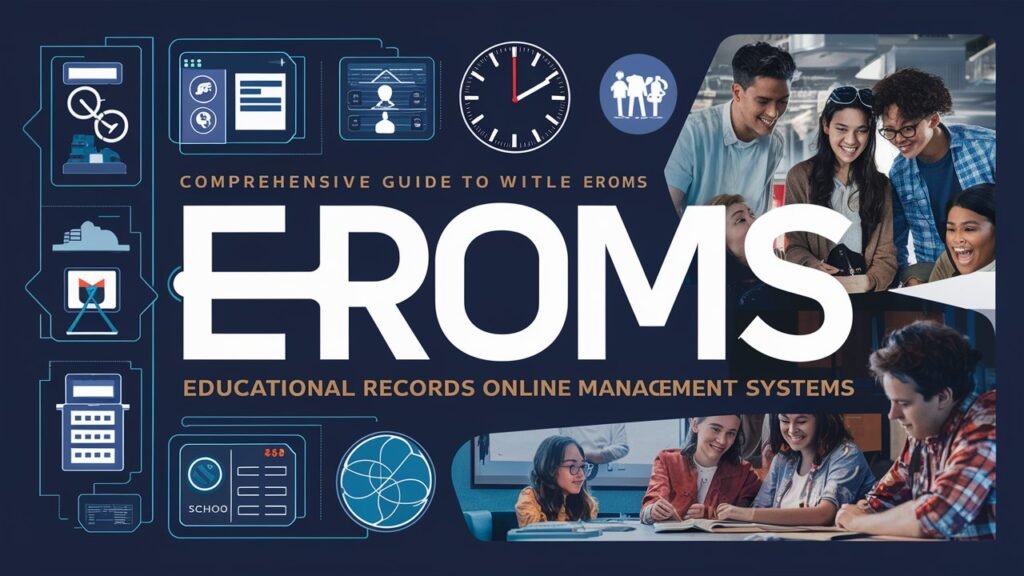In the age of digital transformation, educational institutions worldwide are increasingly adopting smart solutions to improve administrative efficiency, reduce paperwork, and enhance student record management. One such innovation is EROMS – Educational Records Online Management System. Whether you are a school administrator, government education officer, or an IT decision-maker in an academic institution, understanding EROMS is crucial. This comprehensive guide will explore what EROMS is, how it works, its benefits, and why it’s a game-changer in education.
What is EROMS?
EROMS stands for Educational Records Online Management System. It is a cloud-based or software-integrated solution designed to help educational institutions digitally manage, store, and access student-related data securely. From enrollment records, academic transcripts, exam results, attendance logs, to behavioral reports — everything can be accessed and controlled through a centralized system.
These systems are usually developed either by government departments of education or private software vendors, tailored to the needs of schools, colleges, or universities. With rising student populations and increasing demands for transparency and accessibility, EROMS provides a much-needed solution to manage educational data effectively and in real time.
Key Features of EROMS
An advanced EROMS typically includes a wide array of features, including but not limited to:
1. Student Data Management
Administrators can input, update, and retrieve student records including full names, date of birth, guardians’ info, academic history, and other relevant details in one digital location.
2. Online Transcript Generation
Instead of waiting days or weeks for manually prepared transcripts, EROMS allows for immediate transcript generation that’s accurate and formatted as per institutional standards.
3. Attendance and Behavior Tracking
Teachers can log daily attendance and record behavioral notes, which are instantly stored in the system and available for administrative or parental review.
4. Secure User Login
Different stakeholders (students, parents, teachers, and admins) can access EROMS through secure login credentials. Each user role gets custom dashboard views depending on their privileges.
5. Document Upload and Verification
Supporting documents such as birth certificates, prior academic records, or disciplinary reports can be uploaded and verified directly through the system.
Benefits of EROMS for Educational Institutions
1. Efficiency and Time-Saving
By automating tasks like record updates, data retrieval, and report generation, institutions save significant time that can be redirected towards academic planning and student engagement.
2. Accuracy and Transparency
Manual records are prone to errors. EROMS ensures data accuracy and offers a transparent system where entries are traceable and verifiable.
3. Remote Access
One of the biggest advantages is that EROMS is accessible from anywhere. Students, parents, and staff can log in remotely, making it an ideal system for hybrid and distance learning environments.
4. Data Security and Compliance
Modern EROMS platforms comply with data protection regulations. Encrypted logins, regular backups, and audit trails ensure that data is safe from breaches and loss.
How Schools and Governments Are Using EROMS
Governments are increasingly mandating the use of EROMS in public and private institutions to centralize educational data. This allows better planning, easier tracking of national performance metrics, and improved policy-making based on real-time insights.
Schools use EROMS to manage internal data flow between departments, reducing duplication and enabling smoother communication among staff and students. Many institutions also use it during student transfers to other schools, ensuring seamless data handover without delays.
Challenges and Considerations
Despite its benefits, EROMS implementation requires:
-
Proper training for staff and faculty
-
Initial setup cost and infrastructure
-
Regular software updates and IT support
These challenges are minor compared to the long-term advantages. However, decision-makers should plan for gradual onboarding and ensure they choose a system that aligns with their institution’s scale and needs.
Conclusion
EROMS is no longer just a trend — it is fast becoming the backbone of modern educational administration. Whether it’s ensuring data accuracy, reducing paperwork, or enabling fast decision-making, an Educational Records Online Management System delivers exceptional value. As more institutions and governments embrace digital transformation, EROMS will play a critical role in shaping the future of education.
Frequently Asked Questions (FAQs)
❓ What does EROMS stand for?
EROMS stands for Educational Records Online Management System, a digital platform for managing student records.
❓ Is EROMS only for schools?
No. While EROMS is popular in schools, it’s also used in colleges, universities, and government education departments.
❓ How secure is EROMS?
Modern EROMS platforms offer high-level security including encryption, user authentication, and compliance with data privacy laws.
❓ Can parents access their child’s data on EROMS?
Yes, most systems provide parent login portals to view attendance, grades, and behavior reports.
❓ Does EROMS replace manual records completely?
In most cases, yes. EROMS digitizes and centralizes all student-related records, but some institutions may still keep backup physical copies for archival.
